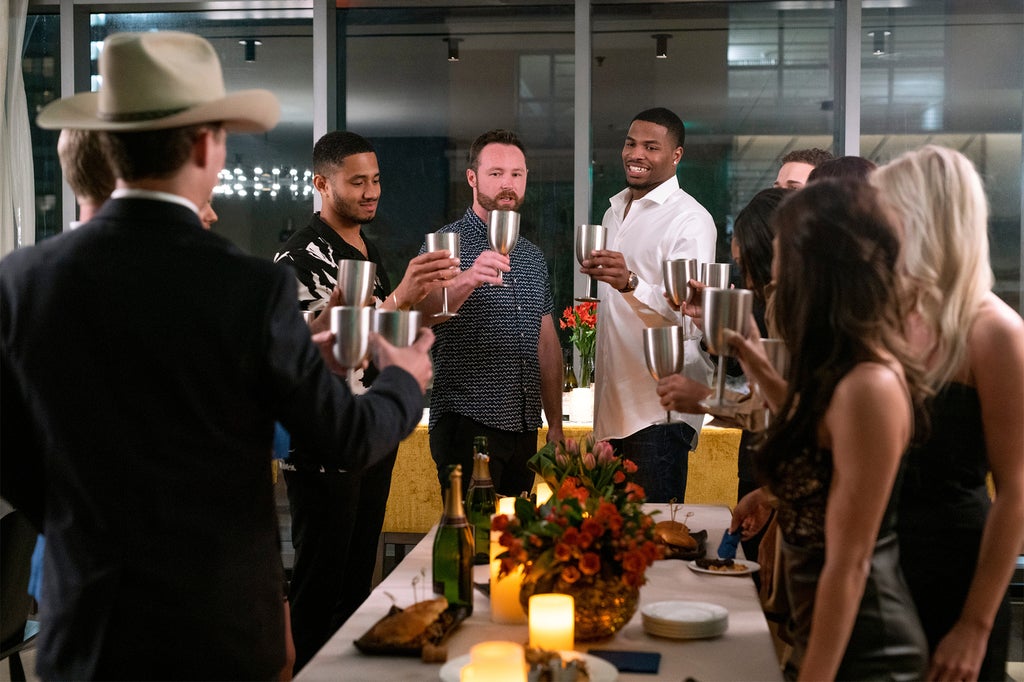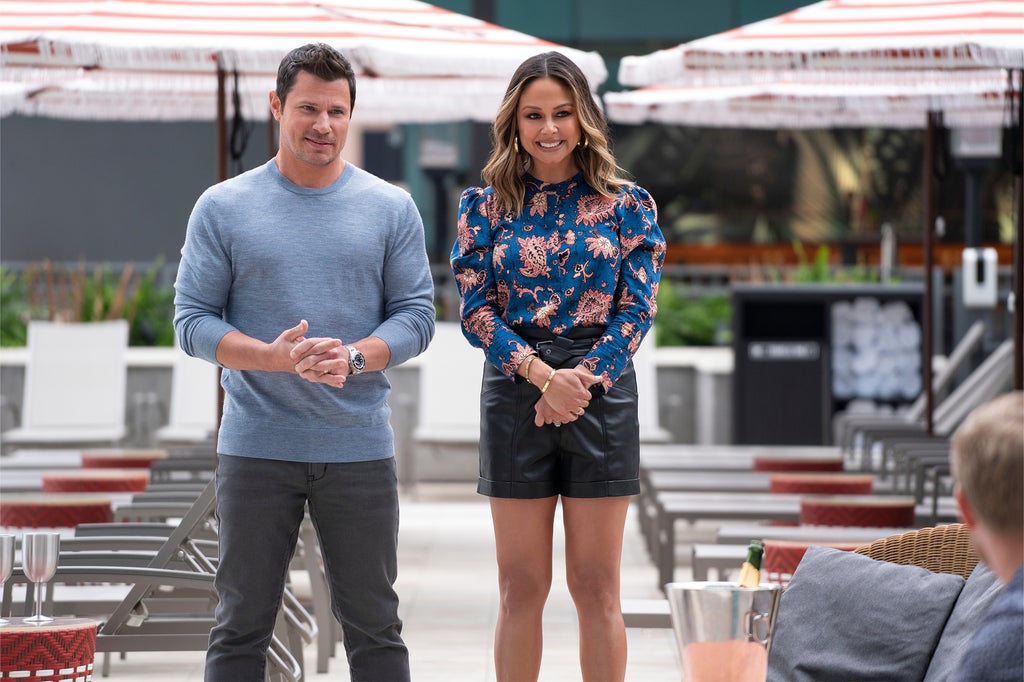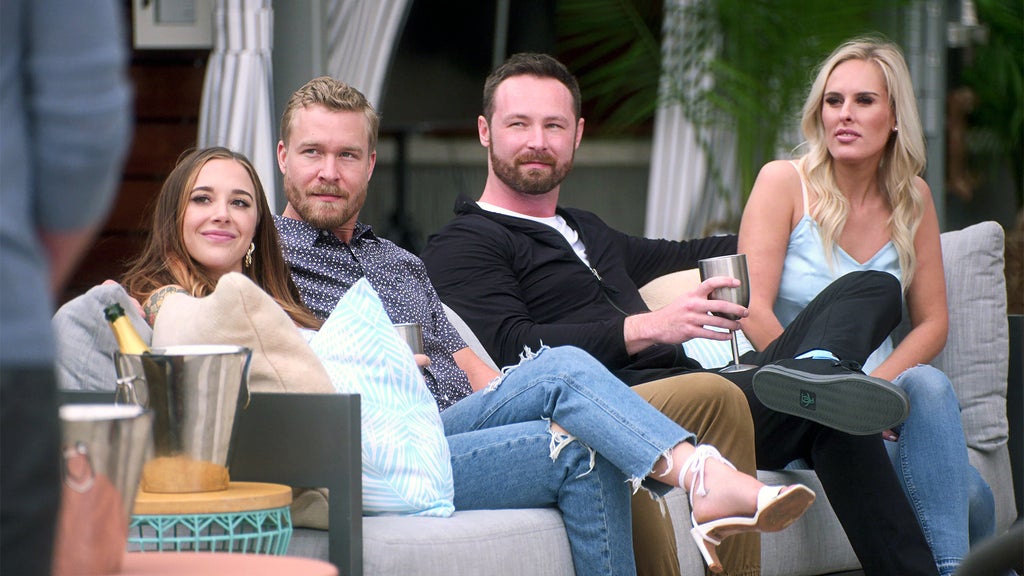
“Psychologists agree that an ultimatum is not a good way to get somebody else to do what you want,” Nick Lachey tells the contestants in episode one of Netflix’s new show, The Ultimatum: Marry or Move On. Brilliant. Great start.
The concept of this new ‘social experiment’ has seen the creators of Love Is Blind take the idea of an ultimatum and change the meaning of it completely, suggesting that in order to know if you want to marry someone, you’ve got to try dating other people, from a pool of six, to help you decide. And so, six couples at a crossroads – to marry or not to marry – have signed up to give it a go.
And while the concept is fundamentally flawed and borderline torturous for those taking part, it quickly becomes clear that there is an opportunity for another potentially compelling area to be explored – one that is increasingly on the minds of many people in their 20s/30s/40s: the decision whether or not to have children.
It culminates in essentially just a couple of guys telling Lauren that she will eventually change her mind, in a way that suggests that this is a part of her that could be – and needs to be – fixed.
One of the couples, Nate Ruggles and Lauren Kilos, are there for this very reason. Nate has given Lauren an ultimatum, based on the fact that she doesn’t want kids, while he definitely does. He also makes it clear that it is important that his future wife has the same desire and enthusiasm to start a family as he does. This already has the potential to be the most interesting set-up and different from the others, which are weighted in favour of the stereotypical ‘woman is desperate for a diamond while man isn’t ready to settle down yet’ storyline.
However, rather than allowing this to play out in a nuanced and potentially helpful way – allowing some real discussions around the reasons Lauren doesn’t want to have children – the conversation isn’t entertained at all. It culminates in essentially just a couple of guys telling Lauren that she will eventually change her mind, in a way that suggests that this is a part of her that could be – and needs to be – fixed.
In the first three episodes, unsurprisingly, there is a lot of discussion around what people want from their lives and relationships. However, the two concepts of marriage and children are conflated as being one and the same, with many seeming to believe that being a wife is inextricably linked with being a mother.
“The big thing with a wife is obviously someone that’s willing and wants to start a family with you,” says Nate in a matter-of-fact manner, as though it is a catch-all statement that applies to every wife, and every man looking for a wife. Clearly not the case.

But then, as expected, comes the drama. In a MAFS-style dinner party with hosts Nick and Vanessa, the six couples each choose which of the others they would like to try dating in an intensive, three-week, ‘fast track’ set-up, after only a few days of getting to know each other. The idea being that this will help them figure out how they feel, both about each other and their original partners.
After several awkward interactions, contestant Colby Kissinger, original partner of Madalyn Ballatori, tells Lauren that he’d like to partner up with her, stating, without a hint of irony, that he thinks he could “teach her how beautiful children could be”. In his interviews, he seems confident that Lauren does in fact want children, she just doesn’t know it yet. He speaks of seeing the “potential” in her. The potential to…act as a vessel for his child?
“In many ways, this is typical of the world we live in,” says Sally Baker, senior therapist at Working on the Body. “There’s a societal-wide presumption that all women will procreate and so, often when women say they don’t want children, they’re not believed. Even when people are woke enough not to voice too much outright disdain, it is still there. It’s so presumptuous, and so cocky, for a man to think ‘I’ll be able to turn your head, I’ll be the one that changes what you think you know.’
“In society we’re still not in a place where it’s considered ‘okay’ for women to not want to have children – there is a general commiseration of being ‘childless’ rather than a celebration of being child-free.”
And unfortunately, The Ultimatum plays out as a microcosm of this. After this speech from Colby, Nate then makes the seemingly rash decision to propose to Lauren, despite the fact that nothing has been resolved. At the end of the day, she still doesn’t want children while he has consistently stated it’s his number one priority in life. As part of his “fake ass” – in the words of contestant April Marie – proposal, he states that he is happy to sacrifice having children to be with her. But it is clear that what has actually happened is that he has started to panic after watching each of the women he had planned on choosing for his three-week trial choose someone else.
And so, in what looks like a jealousy-induced frenzy, Nate gets out of his seat and marches round to Lauren’s side of the table, where he gets down on one knee and pops the question. Confusingly, she says yes – in fact, she gives an enthusiastic “abso-fucking-lutely, yes please”. Lauren doesn’t challenge the comments from Colby or Nate, previously saying that she has never spoken about her reasons for not wanting kids with Nate as it is “unproductive” or ends with “emotions flowing” and “anger”.
It feels like a wasted opportunity not to unpack some of this hugely important conversation on the show and give Lauren a chance to have these conversations. And while it’s Lauren’s prerogative to feel whatever she feels – if she’s happy to marry Nate, that’s up to her – it’s a shame the producers couldn’t have found a way to explore this common feeling in a more meaningful way.
And it is a common feeling. There are endless discussions about women – specifically women – having children later, or deciding not to have children at all.

Earlier this year, the Office for National Statistics (ONS) revealed that for the first time since records began, half of women in England and Wales haven’t had children by the time they reach their 30th birthday – referring to them as ‘childless’. We don’t know how many men haven’t had children by that age because…nobody seems to be counting. This framing of women as childless when we never refer to men as such is unhelpful, old-fashioned and frustrating.
From worries about the environment to the fact that childcare in this country costs more than many people’s full-time wage, the reasons that people – not just women – don’t want children are vast. But to be very clear, we shouldn’t need a reason. Some people just don’t have the desire to have children and that’s okay.
In fact, for many, it’s more than okay. A 2019 study revealed that women who are not married and do not have children are the happiest group in the population. The research found that unmarried women without children are likely to outlive their married, childrearing counterparts, be healthier than them and more likely to foster social connections that bring them fulfilment.
Yet many women who express this desire are still made to feel ‘less than’ or – possibly even more insulting – disbelieved. It seems that both Nate and Colby thought that they could probably talk Lauren round and change her mind. But this has the potential to end in tears for everyone.
“If your partner doesn’t want children, you need to deal with that reality,” says Sally. “You need to not mansplain, coerce or hope that you will wear them down over time. It’s a deal-breaker and it shouldn’t be dismissed or downplayed. It should be discussed until you get to a point where there is a common ground, or there isn’t… And if there isn’t, you should go your separate ways.”
The Ultimatum is available to watch on Netflix now
Like what you see? How about some more R29 goodness, right here?
Women Aren’t “Forgetting” To Have Children